- Home
- Anthony Burgess
The Clockwork Testament (Or: Enderby 's End) Page 11
The Clockwork Testament (Or: Enderby 's End) Read online
Page 11
"Oh dear," Enderby said with mock-humorous exasperation. "You are a hard little taskmistress."
"I've not even started yet. Go on."
In socks and underpants Enderby said: "Will that do?"
"Argh. Disgusting."
"Well, if I'm disgusting why do you want to-"
"Go on. To the horrible disgusting limit."
"No. Ow."
There was an ugly violet glass vase on the mantelpiece. She hit it very neatly as thunderous strafing was resumed on the screen. But at once a commercial break broke in. In unnatural high colour a smirking naked-shouldered woman made love to her slowly floating hair. Weave a circle round him, girls. No, not that. They wouldn't have the bloody sense. Sighing, Enderby stripped down to the limit. His phallus too palpably announced its interest in that camiknick business. He was, as they had so often told him in critical reviews, very much a belated man of the thirties. Sonnet form and so on. The television screen homed to fried chicken. Enderby hid the thing with his hands.
"Disgusting."
"Well, it was your idea, not mine."
"Now," she ordered. "You're going to piss on your own poems."
"I'm going to what?"
"Urinate. Micturate. Squirt your own filthy water on your own filthy poems. Go on."
"They're not filthy. They're clean. What stupid fucking irony. All the genuinely filthy pseudo-art and not-art that's about, and you pick on honest and clean and craftsmanlike endeavour-"
The weapon (in thrillerish locution: Enderby saw the word in botched print at the very moment of firing) spoke again. That frail Indian-type table thing proved itself very frail, tumbling over as though fist-hit in aesthetic viciousness. Enderby's phallus rose a few more notches. He said: "That's three. That means only three left."
"It's enough. Next time I promise it's going to be some of that ugly filthy fat hairy blubbery bloated-" She spoke out of smoke.
Enderby took up the top book with his right hand, his left hand still serving pudeur. It was Fish and Heroes, he saw tenderly. He couldn't open it one-handed, so he turned his bottom towards her and gave both hands to leafing the few but thickish leaves. By God what a genius he had then.
Wachet auf! A fretful dunghill cock
Flinted the noisy beacons through the shires.
A martin's nest clogged the cathedral clock.
Still, it was morning. Birds could not be liars…
And what would Luther have done in these circumstances? He was a great one for farting and shitting, but only on the Fiend. Piss on that Bible, Luther. Unthinkable. But then (O my God, poem there to be written, meaning have to live?) he might have thought: only a copy, the Book subsists above the single copy, I must live, spread the Word, the mature man gives in occasionally to the foolish, evil, mad. Luther lifted up his great skirts, disclosing a fierce red thursday, and pissed vigorously on a mere mess of Gothic print. Here stand I, I can in no wise do otherwise. Enderby said loudly:
"No!"
"I can see what you're looking at," she said. "That sonnet about the Reformation." She knew the bloody book so well, it seemed such a pity. The television film showed a whining GI, cap tucked in epaulette, whining: "Can't we talk this thing over, Mary?"
"Oh, all right then," Enderby said wearily. And he turned his nozzle, with some slight muscular effort, onto the page. "See," he said. "I'm doing my best. But nothing will come. It stands to reason nothing will come. Stand, blast you, is the operative word."
And then, Luther throwing, but it was an inkpot, they showed you the inkstained wall in Wittenberg, Enderby threw the book, which fluttered vogelwise, towards her. Instinctively she shot at it. He had known, somehow, she would. He strode, heavily naked, balls aswing, weapon pointing, through the smoke and the echo of noise. And yet God has not said a word. She aimed straight at him, saying, "If you think you're going to be a fucking martyr for art-"
"Said that already," Enderby said, and he grasped her wrist at the very instant of her firing vaguely at the ceiling. The noise and smell were surely excessive. He had that damned gun now, a dainty hot little engine. She clawed at his buttocks as he went to the window partly open for the heat. Threw the bloody thing out. "There," he said. Luther, he remembered for some reason, had married a nun. Christ's lily and beast of the waste wood. This girl now beat at him with teeny fists. Enderby had had a good supper. He saw the two of them in the little mirror above a bookshelf devoted to psychology deeply Jewish and anguished. He had his glasses on, he observed, would not indeed have been able to observe otherwise, otherwise, of course, naked. He gave her a push somewhere around the midriff. She ended up crying on a pouffe.
"Bastard bastard."
Enderby took off his glasses and placed them carefully on top of the television set, which, well into the noise of impending victory, he clicked off. "You and your bloody guns," he said. "Get you into a bloody mediaeval monastery full of great ballocky monks, that would teach you. Flabby, indeed. Blubber, for Christ's sake. Silenus, Falstaff." This was for his own benefit. "Think of those, blast you." His heart seemed to be pumping away very healthily. Noise of impending victory. Not with a whimper but. "Blaming me, indeed. Blaming poor dead Hopkins. As though I held the nuns down for them."
"Go away. Get away from me."
"I live here," Enderby said. "Sort of." And then he pulled, two-handed, at the hems. Cry, clutching heaven by the. That was just to get a rhyme with Thames. Rhine refused them, Thames would ruin them. Francis Thompson a far inferior poet. Hopkins appeared an instant, open-mouthed, clearly seen moaning at another's sin, though in the dark of the confessional. "You did it," Enderby said. "So fagged, so fashed, indeed. Get away for a bit, can't you?" Hopkins became a pale daguerreotype, then was washed completely out. The skirt was elasticated at the waist and pulled down with little difficulty. In joy, Enderby saw the tops of stockings, suspenders, peach knickers.
"You filthy fucking-"
"Oh, this is all too American," Enderby said. "Sex and violence. What angel of regeneration sent you here?" For there was no question of mumbling and begging now. Enderbius triumphans, exultans.
TEN
This third heart attack, if that was what it had really been, did not seem to be really all that bad-a mere sketch, as to remind him of its shape. But he knew its shape intimately already, that of a Spenglerian parabola. Yet another interpretation seemed, as he sat in the toilet and excreted as quietly as he could, there being a guest in the apartment, possible, though he was fain to reject it. An inner hand showing in delicate deadly gesture the impending chop or noose. He was glad in a way that she had taken possession of the circular bed, no room for him, since bed was a place where people frequently died, sometimes in their sleep. She lay naked on her back, telling, say, ten-twenty with her arms and seven-thirty with her legs, her delicate snoring indicating that it was a fine February night and all was well. She had left her home in Poughkeepsie, it appeared, and was obviously welcome to stay here with Enderby so long as she did not go out to buy another gun. She at least knew his work. Anyway, there was no question of thinking in terms of a nice long future. These heart attacks had been as good to Enderby as a like and you know harangue from one of his students. But he did not really want the chop to come tonight and in his sleep. He fancied doing some more vigorous death-dodging in the light. There was this to be said for New York: it was not dull.
Wiped and having flushed, Enderby went out to the kitchen to make tea. There would be a hell of a row tomorrow, today that was, when that dusky bitch Priscilla came to do the chores (How come an educated man like you live in such Gadarene filth-she was, after all, a Bible scholar); but there always was a hell of a row. This time there would probably be something about fornication and Cozbi as well as dirt. Enderby ate pensively a little cold left-over stew while he waited for the water to boil: quite delicious, really. He seemed to have lost a fair amount of protein in the last few hours, perhaps cholesterol too. When the tea had sufficiently brewed or drawn (five bags only; not overtempt Pro
vidence) and had been sharply sweetened and embrowned, he took it into the living room. He piled pouffe on pouffe to make himself comfortable in order to watch for the dawn to come up. He switched on the television set, which gave him a silly film apt for these small hours. It was a college musical of the thirties (How come that such a scholar / Can put up with such squalor? / Just gimme hafe a dollar / And I'll make it spick and span, man. There was a coincidence!) but it was made piquant with girls in peach-looking camiknicks with metallic hairdos. Enderby did some random leafing through the slim volumes she had brought for him to defile. God, what a genius, etc. The film, with interludes of advertising suspiciously cheap albums of popular music, went harmlessly on while he sipped his tea and browsed.
You went that way as you always said you would,
Contending over the cheerful cups that good
Was in the here-and-now, in, in fact, the cheerful
Cups and not in some remotish sphere full
Of twangling saints, the-pie-in-the-sky-when-you-die
Of Engels as much as angels, whereupon I…
He could not well remember having written that. Besides, the type was blurring. He saw without surprise that the film had changed to one, in very good colour too, about Augustine and Pelagius. Thank God. The thing had after all been at last artistically dealt with, no need after all for him to worry about finding an appropriate poetic form.
35. (SAY) EXTERIOR DAY A ROAD
A man vigorously whipping his donkey, which brays in great pain. His wife comes along to tell him to desist.
WIFE: Desist, desist. The poor creature meant no harm, Fabricius.
MAN: Farted in my face, didn't it? A great noseful of foul air.
(he continues beating)
WIFE: Foul, you say? She eats only sweet grass and fresh-smelling herbs, while you-you guzzle sour horsemeat and get drunk on cheap wine.
MAN: Oh, I do, do I? Take that, you slut.
(he beats her till she bleeds)
36. THE SAME TWO SHOT
Pelagius and Obtrincius are watching. The noise and the cries are pitiable.
OBTRINCIUS: What think you of that, O man of the northern seas? Evil, yes? It comes of the primal fetor of Adam which imbrues the world.
PELAGIUS: Ah no, my dear friend. Adam's sin was his own sin. It was not inherited by the generality of mankind.
OBTRINCIUS: But this is surely foul heresy! Why was Christ crucified except to pay, in Godflesh whose value is incomputable, for the Adamic sin we all carry? Have a care, my friend. There may be a bishop about listening.
PELAGIUS: Ah no, he came to show us the way. To teach us love. Be ye perfect, he said. He taught us that we are perfectible. That what you call evil is no more than ignorance of the way. Hi, you, my friend.
37. RESUME 35.
The man Fabricius has now turned on his son, who, having apparently intervened to save his mother from the vicious blows, is bloody and bowed. The mother weeps bloodily. The ass looks on, sore but impassive, also bloody.
MAN: (temporarily desisting) Huh? You address me, sir?
38. RESUME 36.
PELAGIUS: (cheerfully) Yes, my good man and brother in Christ.
He moves our of the shot and into:
39. TWO SHOT: MAN AND PELAGIUS
PELAGIUS: Ah, my poor friend, you have much to learn. Sweet reason has temporarily deserted you. Take breath and then blow out your anger with it. It is a mere ghost, a phantasm, totally insubstantial.
MAN: You use fine words, sir. But try using sweet reason to stop a donkey farting in your nose.
PELAGIUS: You should keep your nose away from the er animal's posterior. Sweet reason must surely tell you that.
MAN: Oh, well, mayhap you're right, sir. Anger wastes time and uses up energy. Come, wife. Come, son. I will be reasonable, God forgive me.
(sketching a blessing, Pelagius moves out of shot) Sweet reason, my ass.
40. EXTERIOR DAY ROME: A SCENE OF UNBRIDLED REVELRY
A LS of a sort of carnival. Instruments of the fifth century A.D. are blaring and thumping, while unbridled revellers frisk about, kissing and drinking and lifting kirtles.
41. THE SAME GROUP SHOT
A group of gorgers are greasily fingering smoking haunches and swineshanks, stuffing it in, occasionally vomiting it out.
PELAGIUS (OS): My friends!
They all look in the same direction, open mouths exhibiting half-chewed greasy protein.
42. THEIR POV: PELAGIUS
He stands with pilgrim's staff, looking with calm sorrow.
PELAGIUS: Does not reason tell you that such excess is unreasonable? It coarsens the soul and harms the body.
(There is a noise of lavish vomiting) There, you see what I mean.
43. PELAGIUS'S POV
The gorgers look somewhat abashed, but a bold fat bald one speaks up baldly and boldly.
FAT GORGER: We cannot help it, man of God, whoever you are, a stranger by your manner of speech. The seven deadly sins, of which gluttony, as thou mayhap knowest, is one, are the seven worms in the apple we ate at the great original feast which still goes on, and of which Adam and Eve are the host and the hostess.
ANOTHER GORGER: (much thinner, as with a worm, or even seven, inside him) Aye, he speaketh truly, monk, whoever thou art. We are born into sin through none of our willing, and has not Christ atoned for our sins, past, future, and to come?
44. RESUME 42.
PELAGIUS: (very loudly) No He Has Not.
45. A GROUP OF FORNICATORS
Mitred bishops, bearded, venerable, lusty, look up from clipping their well-favoured whores. They look at each other, frown.
46. INTERIOR NIGHT THE HOUSE OF FLACCUS
The bishop Augustine sits at the end of dinner with his friend Flaccus, a public administrator. There are other guests, including Bishop Tarminius-one of the bishops who frowned in Scene 45.
FLACCUS: (while a slave proffers a dish) Perhaps an apple, my lord bishop?
AUGUSTINE: (shuddering) Ah no, Flaccus my friend. If you only knew what part apples have played in my life-
TARMINIUS: And one apple in the life of all mankind.
AUGUSTINE: (looking at him for an instant, then nodding gravely) Yes, Tarminius, very true. But oh, the moonwashed apples of wonder in the neighbour orchard. I did not steal the apples because I needed them-indeed, my father's apples were far better, sweeter, rosier. I stole them because I wished to steal. To sin. It was my sin I loved, God help me.
FLACCUS: Aye, it is in all of us. Baptism is but a token of extinguishing the fire-
AUGUSTINE: Burning burning burning burning-
FLACCUS: But Christ paid, atoned, still makes the impact of our daily sin on the godhead less acute.
AUGUSTINE: Beware of theology, Flaccus. These deep matters have driven mad many a young brain.
TARMINIUS: You speak very true, Augustine. There is a man from Britain in our midst-didst know that?
AUGUSTINE: There are many from Britain in our midst-that misty northern island where the damp clogs men's brains. They are harmless enough. They blink in our southern light. They go down with the sun. (laughter)
TARMINIUS: I refer to one, Augustine, who seems not to be harmless, whose gaze is very steady, who is impervious to sunstroke. His name is Pelagius.
FLACCUS: (frowning) Pelagius? That is not a British name.
TARMINIUS: His true name is Morgan, which, in their tongue, means man of the sea. Pelagius, in Greek, means exactly the-
AUGUSTINE: (testily) Yes yes, Tarminius. I think we all know what it means. Hm. I have heard a little about this man-a wandering friar, is he not? He has been exhorting the people to be kind to their wives and asses and warning of the dangers of gluttony. Also, I understand-
(he looks sternly at Tarminius, who looks sheepish rather than shepherdish)
Fornication. I see no harm in such simple homiletic teaching. They are a puritanical lot, our brothers of the north.
TARMINIUS: But, Augustine, h
e is doing more. He is denying Original Sin, the redemptive virtues of God's grace, even, it would seem, our salvation in Christ. He seems to be saying-that man does not need help from heaven. That man can better himself by his own efforts alone. That the City of God can be realised as the City of Man.
AUGUSTINE: (astounded) But-this-is-heresy! Oh my God-the poor lost British soul-
There is a sudden spurt of flame which ruddies the scene. All look to its source. The camera whip-pans to the spit, where flames are fierce. A toothless scullion grins, touching a forelock in apology.
SCULLION: Sorry, my lords, sir, gentlemen. A bit of fat in the fire.
47. GROUP SHOT
Augustine, Tarminius, Flaccus look very grim.
AUGUSTINE: Fat in the fire, indeed.
48. INTERIOR DAY A HOVEL
Pelagius is talking gently and wisely to a group of poor men, artisans, layabouts, who all listen attentively. A pretty girl named Atricia sits at his feet and looks up in worship.
PELAGIUS: In my land the weather is always gentle, rather misty, never lacking rain. The earth is fertile, and by our own efforts we are able to bring forth fair crops. The sheep munch good fat grass. There are no devilish droughts, there is no searing sun. It is no land for praying in panic-not like the arid Africa of our friend the Bishop Augustine.

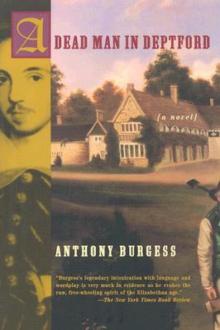 A Dead Man in Deptford
A Dead Man in Deptford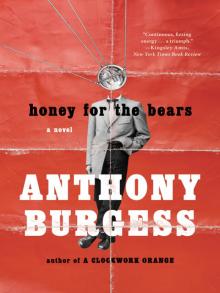 Honey for the Bears
Honey for the Bears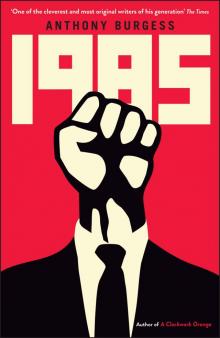 1985
1985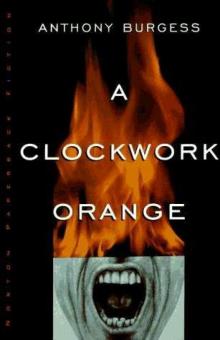 A Clockwork Orange
A Clockwork Orange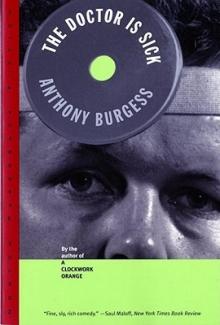 The Doctor Is Sick
The Doctor Is Sick Earthly Powers
Earthly Powers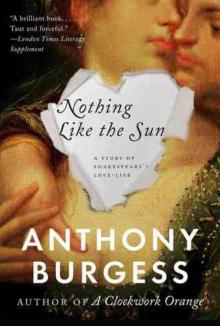 Nothing Like the Sun
Nothing Like the Sun Collected Poems
Collected Poems The Kingdom of the Wicked
The Kingdom of the Wicked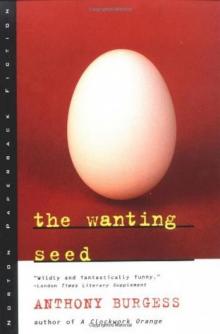 The Wanting Seed
The Wanting Seed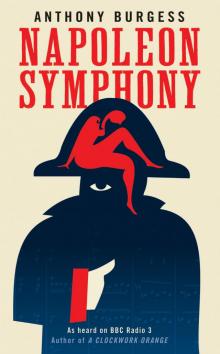 Napoleon Symphony
Napoleon Symphony The Malayan Trilogy
The Malayan Trilogy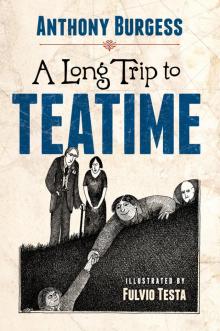 A Long Trip to Teatime
A Long Trip to Teatime Enderby Outside
Enderby Outside M/F
M/F The Complete Enderby
The Complete Enderby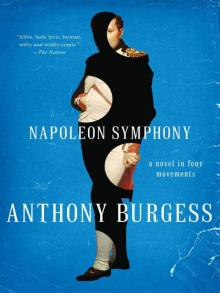 Napoleon Symphony: A Novel in Four Movements
Napoleon Symphony: A Novel in Four Movements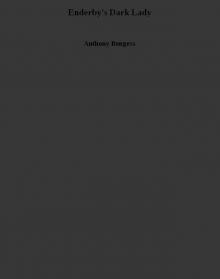 Enderby's Dark Lady
Enderby's Dark Lady The Clockwork Testament (Or: Enderby 's End)
The Clockwork Testament (Or: Enderby 's End) ABBA ABBA
ABBA ABBA A Clockwork Orange (UK Version)
A Clockwork Orange (UK Version)